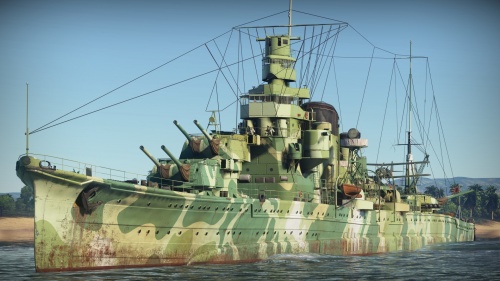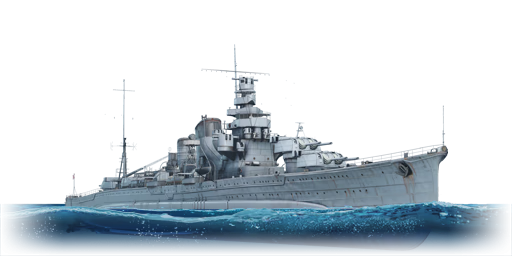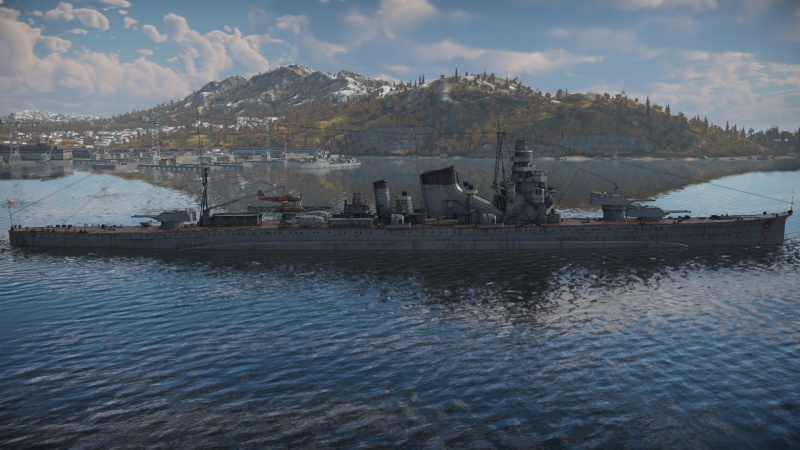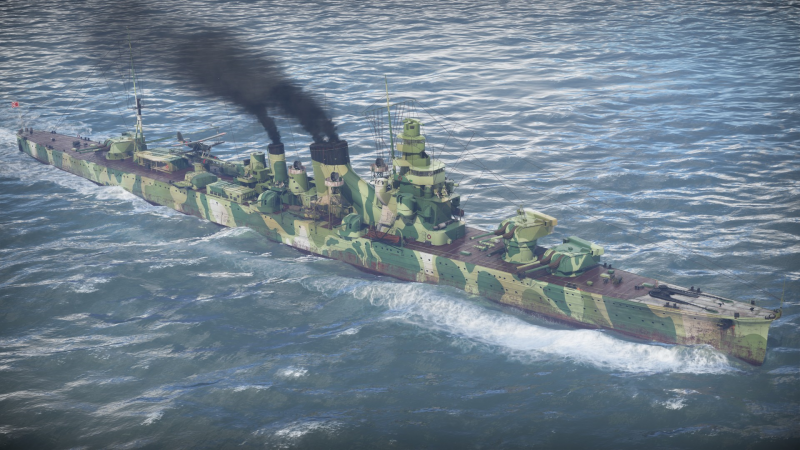Difference between revisions of "IJN Furutaka"
m (→Primary armament) |
(→Primary armament) |
||
| Line 62: | Line 62: | ||
|- | |- | ||
|} | |} | ||
| − | |||
{| class="wikitable sortable" style="text-align:center" width="100%" | {| class="wikitable sortable" style="text-align:center" width="100%" | ||
! colspan="10" | Shell details | ! colspan="10" | Shell details | ||
| Line 69: | Line 68: | ||
! rowspan="2" | Type of<br>warhead | ! rowspan="2" | Type of<br>warhead | ||
! rowspan="2" | Velocity<br>(m/s) | ! rowspan="2" | Velocity<br>(m/s) | ||
| − | ! rowspan="2" | Projectile<br> | + | ! rowspan="2" | Projectile<br>mass (kg) |
! rowspan="2" | Fuse delay<br>(s) | ! rowspan="2" | Fuse delay<br>(s) | ||
! rowspan="2" | Fuse sensitivity<br>(mm) | ! rowspan="2" | Fuse sensitivity<br>(mm) | ||
| − | ! rowspan="2" | Explosive | + | ! rowspan="2" | Explosive mass<br>(TNT equivalent) (kg) |
! colspan="3" | Ricochet | ! colspan="3" | Ricochet | ||
|- | |- | ||
! 0% !! 50% !! 100% | ! 0% !! 50% !! 100% | ||
|- | |- | ||
| − | | Type 0 HE || HE || 835 || 125.4 || | + | | Type 0 HE || HE || 835 || 125.4 || 0 || 0.1 || 8.57 || 79° || 80° || 81° |
|- | |- | ||
| − | | Type 91 AP || APHEBC || 835 || 125. | + | | Type 91 AP || APHEBC || 835 || 125.85 || 0.05 || 9 || 3.26 || 48° || 63° || 71° |
|- | |- | ||
| − | | Type 0 HE-TF || HE-TF || 835 || 125.4 || | + | | Type 0 HE-TF || HE-TF || 835 || 125.4 || 0 || 0.1 || 8.57 || 79° || 80° || 81° |
|- | |- | ||
|} | |} | ||
Revision as of 08:55, 25 October 2022
| This page is about the Japanese heavy cruiser IJN Furutaka. For other uses, see Furutaka (Family). |
Contents
Description
The Furutaka-class, IJN Furutaka, 1942 (古鷹, namesake: Mount Furutaka) is a rank IV Japanese heavy cruiser with a battle rating of 5.7 (AB/RB/SB). It was introduced in Update 1.89 "Imperial Navy".
With the arms races during late 1930s rendering the Washington naval treaty null and void, the Imperial Japanese Navy started a massive modernization program for most, if not all of their ships. IJN Furutaka was one of the ships to receive a major overhaul. With the weight restrictions removed, the Furutaka's beam was widened to accommodate new machinery, such as replacing the six single 200 mm turrets with three improved twin 203 mm 3rd year turrets, an addition of torpedo bulges, replacing the hull-mounted torpedo tubes with conventional launchers with the famous Type 93 "Long Lance" torpedoes, improved Kampon boilers to maintain the ship's mobility with her increased weight, as well as improved anti-air defense. Compared to her sister ship Kako, the Furutaka leans more towards a conventional heavy cruiser, featuring good continuous firepower and various weaponry to deal with all kinds of targets.
General info
Survivability and armour
The Furutaka's armour layout is mostly the same as her sister ship Kako with some improvements, most notably the addition of 57 mm of RHA around her ammo elevators that made them less prone to damage, as well as a torpedo bulge capable of taking up to 250 kg torpedo hits. One negative change being that a small coal bunker strip on the upper midship section were removed, though this reduced protection is mostly negligible.
As with the Kako, Furutaka's armour is very effective when angled properly. Since the Furutaka has more crew than the Kako (680 men compared to Kako's 616) and only has a few extra AA mounts, she can survive a bit longer than her sister ship.
The Furutaka retains the unique fire resistant characteristics from the Kako, meaning that she will suffer less casualties from a fire damage and sometime doesn't lose any at all. This made the Furutaka much more beginner friendly than other ships at her rank, as well as highly survivable with proper damage control.
Mobility
With her displacement increased by 2,600 tons, the Furutaka is noticeably slower than her predecessor. Although she is still fast for a heavy cruiser with top speed of 71 (AB)/61 (RB) km/h with good acceleration. She is fairly slow to decelerate and traverse around, though it's still decent for her class nonetheless.
| Mobility Characteristics | |||
|---|---|---|---|
| Game Mode | Upgrade Status | Maximum Speed (km/h) | |
| Forward | Reverse | ||
| AB | |||
| Upgraded | 71 | 23 | |
| RB/SB | |||
| Upgraded | 61 | 20 | |
Modifications and economy
Armament
Primary armament
The Furutaka's main armament consists of six 203 mm 3rd year type No.2 cannons mounted in three twin turrets in A-B-X setup. This gun is the standard armament for the Japanese heavy cruisers next in the line such as the Mogami and Tone and thus is very powerful. The turrets have sluggish traverse speed and are poorly protected, but have a very wide coverage that allows the Furutaka to fire broadsides from up to 75 degrees of angle, increasing the ship's effectiveness when angled.
The 203 mm has three shell choices: a basic HE shell with 8.57 kg of TNT equivalent that can deal a decent amount of damage per hit, a powerful APBC shell with 235 mm of penetration at 10 km and packing a sizeable explosive filler of 3.25 kg TNT equivalent, and an HE-TF shell, which is near useless due to the slow turret traverse speed. The gun has a good reload time at 12 seconds (ace crew), though she will be occasionally outgunned by her opponents due to the low gun count.
| Penetration statistics | |||||||
|---|---|---|---|---|---|---|---|
| Ammunition | Type of warhead |
Penetration @ 0° Angle of Attack (mm) | |||||
| 1,000 m | 2,500 m | 5,000 m | 7,500 m | 10,000 m | 15,000 m | ||
| Type 0 HE | HE | 61 | 61 | 61 | 61 | 61 | 61 |
| Type 91 AP | APHEBC | 362 | 321 | 263 | 218 | 182 | 139 |
| Type 0 HE-TF | HE-TF | 61 | 61 | 61 | 61 | 61 | 61 |
| Shell details | |||||||||
|---|---|---|---|---|---|---|---|---|---|
| Ammunition | Type of warhead |
Velocity (m/s) |
Projectile mass (kg) |
Fuse delay (s) |
Fuse sensitivity (mm) |
Explosive mass (TNT equivalent) (kg) |
Ricochet | ||
| 0% | 50% | 100% | |||||||
| Type 0 HE | HE | 835 | 125.4 | 0 | 0.1 | 8.57 | 79° | 80° | 81° |
| Type 91 AP | APHEBC | 835 | 125.85 | 0.05 | 9 | 3.26 | 48° | 63° | 71° |
| Type 0 HE-TF | HE-TF | 835 | 125.4 | 0 | 0.1 | 8.57 | 79° | 80° | 81° |
Secondary armament
The Furutaka retains four 120 mm 10th year type cannons from the Kako. The guns can still work well against PT boats and small crafts, but will not help much against larger vessels and aircraft.
Anti-aircraft armament
The Furutaka's anti-air capability is improved from the Kako with the addition of 8 x Type 96 AA guns in four twin mounts placed around her second funnel. While the ship is no longer defenseless against aircraft, the Type 96 AA guns have a rather short effective range at around 2 km, and the low number of guns for her size means that enemy aircraft can still manage to get past your defense and drop their payload. It is always recommended to man the gun yourself as soon as you spot an enemy getting close to your ship, since the AI gunners is too ineffective at engaging enemies.
Additional armament
The Furutaka is equipped with 16 x Type 93 Model 1 torpedoes, launching from quadruple launchers on the port and starboard side on the midship section. Each sides can launch up to 8 torpedoes, with 4 inside the tube and 4 reloads. As usual, with fast travel speed, very long range, and huge warhead, the "Long Lance" torpedoes are highly effective against any targets.
Scout plane
Located amidships is a catapult with one E7K2 scout plane which provides unique offensive and defensive abilities, expanding tactical options. Ship-launched scout planes fly just like regular tree units but lack munition choices and cockpit views. The E7K2 is equipped with only defensive machine gun turrets (ventral as well as dorsal) but it does carry 4 x 60 kg bombs. It also has the scout plane ability to cap zones and lay down smoke cover (up to 3 times). Captains will be wise to remember to utilize the aircraft and consider when best to use it, for example to cap a point early or late in the match, to create a smoke screen to stymie enemy bombardment and repair, to attack enemy units directly, or perhaps something completely new! Carrying a heavier bomb load than most other scout planes, this unit has a very good chance to sink enemy boats or even a destroyer.
Usage in battles
The Furutaka is a versatile ship that can fulfil many roles, with a combination of good protection, powerful armaments, and decent mobility. She is able to take many hits from most enemies except dreadnoughts when angled properly, while capable of dealing huge damage in return with her main guns and torpedoes. Due to this, the Furutaka will be usually targeted by the enemy team.
With her wide firing range, angling the hull will greatly benefit the Furutaka, as not only is she able to deliver full salvoes at steep angles, she is also much harder to be damaged as her profile will appear smaller, as well as bouncing a lot of shells from the enemy. However, always remember that you are not a one-man army, and you will need someone to cover your back, especially against aerial threats.
Pros and cons
Pros:
- Powerful main armament
- Accurate 6 x 203 mm (8 inch) cannons with good reload time
- Can do full broadsides from an even more steep angles compared to the Kako
- Very powerful APBC shell
- Great survivability
- Can take a lot of punishments when angled properly
- Resilient against fire damage
- Decent mobility for a heavy cruiser
- Equipped with powerful 16 x Type 93 torpedoes
- One scout plane.
Cons:
- Early war Japanese fit
- Main turrets can be easily knocked out
- Slow turret traverse
- Weak anti-air capability
- Torpedo turrets can't both be used at once and has to turn the whole hull to make use of the other
- Large target and usually priority targeted over other vessels
History
Furutaka, although being the lead ship of her class, was laid down after her sister ship Kako in December 1922 at the Mitsubishi shipyard in Nagasaki. Despite construction on Furutaka starting later than on her sister ship, she was completed sooner and was commissioned into service with the IJN in March 1926.
During the interwar period, Furutaka served alongside her sistership before being assigned as a reserve in the early 1930s. During this time, Furutaka underwent overhaul work which, amongst other changes, modernized her anti-air armament. Following the completion of the modernization effort, Furutaka was recommissioned into active service.
However, by 1937 Furutaka found herself once again in drydock for another major overhaul. This time around, Furutaka received upgrades in almost all aspects. Most notably, her primary armament was upgraded to three dual 8-inch guns, a number of smaller calibre AA weapons were added and the previously integrated torpedo launchers were replaced with two quadruple launchers abaft of the funnels. This increased Furutaka's overall displacement significantly, prompting the addition of bulges to the hull in order to preserve stability and also act as an additional layer of torpedo protection.
Modernized for war, Furutaka began her service career by taking part in the invasion of Guam in December 1941 and later, Wake Island. In early 1942, Furutaka assisted in Japanese landings in New Guinea and the Solomon Islands.
Furutaka also took part in the Battle of the Coral Sea in May 1942, securing the capture of Tulai island, escorting the Shōhō carrier, and then escorting the damaged aircraft carrier Shōkaku back to Truk. After reorganization in the Japanese navy, Furutaka participated in the successful Battle of Savo Island, witnessing the sinking of her sister ship Kako while Japanese forces returned to Rabaul. However, Furutaka joined her sister ship in the deep shortly afterwards, being sunk by American fire during the Battle of Cape Esperance later in October 1942.
- From Devblog
Media
- Skins

See also
Links to articles on the War Thunder Wiki that you think will be useful for the reader, for example:
- reference to the series of the ship;
- links to approximate analogues of other nations and research trees.
External links
| Mitsubishi Shipbuilding Company Ltd. | |
|---|---|
| Light Cruisers (CL) | |
| Kuma-class | IJN Tama |
| Sendai-class | IJN Sendai |
| Mogami-class | IJN Mikuma |
| Heavy Cruisers (CA) | |
| Furutaka-class | IJN Furutaka |
| Aoba-class | IJN Aoba |
| Myōkō-class | IJN Haguro |
| Tone-class | IJN Tone |
| Battleships (BB) | |
| Ise-class | IJN Hyuga |
| See also | Mitsubishi Heavy Industries, Ltd. (Post-War) |
| Japan heavy cruisers | |
|---|---|
| Furutaka-class | IJN Furutaka · IJN Kako |
| Aoba-class | IJN Aoba |
| Myōkō-class | IJN Myoko · IJN Haguro |
| Mogami-class | IJN Mogami |
| Tone-class | IJN Tone |






